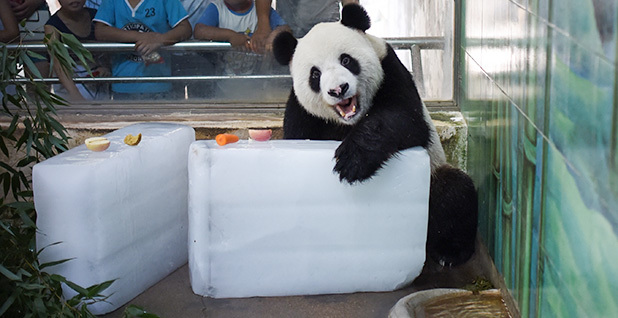There are some people that still do not believe that the planet is getting warmer, that it is being caused by human behavior and that the consequences on human civilization will have horrible effects. Some of those people are receiving this blog.
I am not going to mention in this blog the impact that a hotter climate will have on humans and all living things. The purpose today is simply to display once again the unfaltering pattern of increased temperatures around the globe. While the science of projecting the future is not perfect, the direction continues unabated and is getting quite horrific. I cringe to think of what a temperature of over 110 degrees for a prolonged period of time would be like here in Chicago…how many people would suffer and die and what it would do to crops and food supplies for the local farmers.
But this is occurring around the world. And it is causing social problems that we can only begin to comprehend. This is already a serious and real problem in many peoples’ lives today.
“The past June continued the inexorable upward march of temperatures as it was the 14th consecutive month to break records.
Global temperatures have risen by more than 1 degree Celsius above the late 19th-century average, according to NASA scientists (ClimateWire, July 20). 2016 will almost certainly set a record, due to global warming and an El Niño, a circulation pattern that elevated temperatures around the world and is just dying down.
Anomalous temperatures have been recorded around the world this summer. A heat wave set a record in India as temperatures of 123.8 F were recorded in Rajasthan in May.
On July 21, temperatures at Mitrabah, Kuwait, rose to 129.2 F, the highest recorded in the Eastern Hemisphere and Asia, according to the World Meteorological Organization.”
Heat wave: Your questions answered
Gayathri Vaidyanathan, E&E reporter
Thursday, July 28, 2016
 A giant panda eats a carrot as it embraces ice blocks to cool off on a scorching day at the Wuhan Zoo in Wuhan, China.The heat wave sweeping across south China has killed at least six people, with more than 350 suffering from heatstroke, according to authorities. Photo courtesy of AP Images.
A giant panda eats a carrot as it embraces ice blocks to cool off on a scorching day at the Wuhan Zoo in Wuhan, China.The heat wave sweeping across south China has killed at least six people, with more than 350 suffering from heatstroke, according to authorities. Photo courtesy of AP Images.
The changing winds bear good news: The heat wave is on the wane.
For much of this week, temperatures across the United States have been blistering. In Washington, D.C., thermometers hit 100 degrees Fahrenheit on Monday, breaking records for July. The heat was caused by a strong ridge of high pressure that parked over most of the United States and formed a dome of stifling heat and humidity.
The weather pattern is dissipating and being replaced, from the Mississippi Valley through the Northeast, with rain, said Bob Oravec, lead forecaster at the National Oceanic and Atmospheric Administration’s National Weather Service.
“The worst of the heat wave is over, the weather pattern has definitely changed,” Oravec said.
Only a handful of regions will continue to swelter, including eastern North Carolina, southeastern Virginia, northeastern South Carolina and the desert Southwest, Oravec said.
Could humans have contributed to this heat wave through their carbon emissions? ClimateWire ponders this, and other questions:
1. Was this heat wave unusual?
Not really. This heat wave persisted for just over a week. Similar weather patterns have previously stayed in place for months, Oravec of NWS said. Typically speaking, the longer a heat wave persists, the more damage it does.
“It is summertime, so you get hot weather in summer,” Oravec said.
But this is just the weather report. With respect to the climate — the long-term behavior of weather — heat waves seem to be occurring more frequently, according to the National Climate Assessment.
Some studies have linked this trend to global warming. If humans were not warming the planet, the number of heat waves in the past decade may have been lower by a factor of five, one studyfound.
Heat waves globally are expected to become longer, more frequent and more intense by 2100, according to the Intergovernmental Panel on Climate Change.
2. Was the U.S. heat wave linked to climate change?
Probably, because all weather events are happening on a planet that has been fundamentally changed by humans’ carbon emissions.
Heat waves can be easily tied to climate change, according to the National Academies of Sciences, Engineering and Medicine (ClimateWire, March 14). Basic physics dictates that rising carbon dioxide levels in the atmosphere will drive a rise in temperatures, and this is captured well in climate models.
“Temperature is the simplest part of climate change,” Ted Shepherd, a climate scientist at the University of Reading, said in a March interview. “We know temperatures are warming for sure, and they are warming on continental scales as well as globally, so we expect there will be more warm extremes. It’d be almost incredible not to have an increase in warm extremes.”
Climate scientists every year assemble a massive report in the Bulletin of the American Meteorological Society, where they attribute a role for humans in some extreme events. Since 2012, they have studied around 20 heat waves, Stephanie Herring, an attribution scientist at NOAA’s National Centers for Environmental Information, said in an interview earlier this year.
For the vast majority of heat waves they looked at, “we have been able to find a fingerprint of human influence on either the intensity or frequency of the event,” she said.
In some cases, climate change increased the probability of the heat wave by more than a factor of 10.
3. So, how much of it was due to humans?
Figuring out exactly how much of a role humans played will take a few months to a year, provided it piques a scientist’s interest.
Some attempts are afoot to attribute extreme weather events, such as heat waves, while the memory of the event is still fresh in people’s minds (ClimateWire, June 14). But these are still preliminary, and scientists are selective about the events they study.
Separately, Dáithí Stone, an attribution scientist at the Lawrence Berkeley National Laboratory, every month tries to “forecast” the link between climate change and heat events. His efforts are rudimentary and have large uncertainties attached, Stone cautioned, but the broader findings are interesting.
“It tells us how much more — or less — likely something like a heat wave might be than it would have been without greenhouse gas emissions,” he said.
Stone released his July forecast last month. His models suggested that greenhouse gas emissions had increased the chances of an unusually hot month for some regions of the United States. It was less conclusive for other regions, he said.
“Over the several years that we have been running this, there is a clear increase in the chance of a hot July over all parts of the U.S., and probably at least a doubling of the chance [of a hot July],” he said.
4. Has the planet warmed overall?
The past June continued the inexorable upward march of temperatures as it was the 14th consecutive month to break records.
Global temperatures have risen by more than 1 degree Celsius above the late 19th-century average, according to NASA scientists (ClimateWire, July 20). 2016 will almost certainly set a record, due to global warming and an El Niño, a circulation pattern that elevated temperatures around the world and is just dying down.
Anomalous temperatures have been recorded around the world this summer. A heat wave set a record in India as temperatures of 123.8 F were recorded in Rajasthan in May.
On July 21, temperatures at Mitrabah, Kuwait, rose to 129.2 F, the highest recorded in the Eastern Hemisphere and Asia, according to the World Meteorological Organization.
China, too, is simmering as the mercury has risen to 102 F in some parts of the country, according to the China Meteorological Administration, which issued a three-day heat wave alert. To keep cool, zoo animals were sheltered in air conditioning and played with giant blocks of ice, according to media reports.
Twitter: @gayathriv Email: gvaidyanathan@eenews.net
Sent from my iPad
Charles E Frank
312-613-2204
zsf6116@gmail.com



